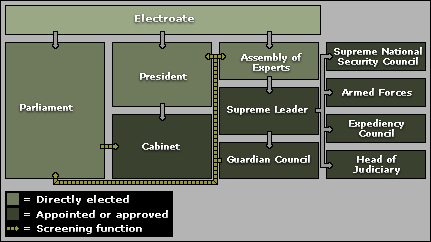For me, one of the most interesting aspects of the Iranian nuclear negotiations is the sanctions, their meanings and classifications, and the circumstances under which they may be removed.
For months, or perhaps even years, Iranian officials have unanimously and unequivocally stated that
'all' sanctions must be removed, and removed immediately. The P5+1, especially the Americans have stated that nuclear sanctions are a part of the negotiations, while 'non-nuclear' sanctions are not. Recently, Iranian rhetoric softened slightly when Ayatollah Khamenei stated that there will be a time-table for the removal of sanctions rather than immediate and complete reversal. The latest statement from the Iranian negotiating team in Vienna however,
insists on removing an arms embargo placed on Iran.
They are, as far as I can tell, referring to the
UN Security Council Resolution 1747,
unanimously supported in 2007, punishing Iran for proliferation concerns and not fully complying with the IAEA. The sanctions clearly have a nuclear connection, but at the same time, explicitly mention ballistic missiles. The factsheet
released by the White House in April in the JCPOA (Joint Comprehensive Plan of Action) emphatically states that while nuclear sanctions will be removed,
"U.S. sanctions on Iran for terrorism, human rights abuses, and ballistic missiles will remain in place under the deal." The following excerpt from the JCPOA indicates that there is a plan to create a new resolution reaffirming the embargo on "conventional arms and ballistic missiles".
Given the inconsistencies here, there are a few important questions to be asked:
- Will the arms embargo remain or be renewed in some way?
- Is Iran reneging on previously agreed terms?
- Did the White House put this in the JCPOA while it was still up for negotiation?
- Is this appeasement of hardline constituencies? Is one side trying to take advantage of the other? Does Iran not want a nuclear deal after all?
These questions are incredibly important, not only for understanding the contributions made by the different sides, but also because there are legitimate concerns over weaponry going to and coming from Iran. Hezbollah and other terror groups are armed by Iran, and easing restrictions on the Iran's armaments is bound to create further instability. Israel has not been afraid to bomb
Syria,
Lebanon and
Sudan when they feel threatened by a possible arms transfer, usually of more advanced weaponry. The likelihood of this happening again would be much higher with this arms embargo removed. Iran may change its behavior towards its terror clients in the long-term, but a radical reduction in the scope and frequency of its covert actions is unlikely in the short term.

